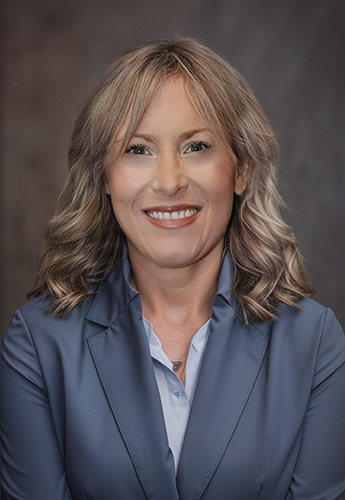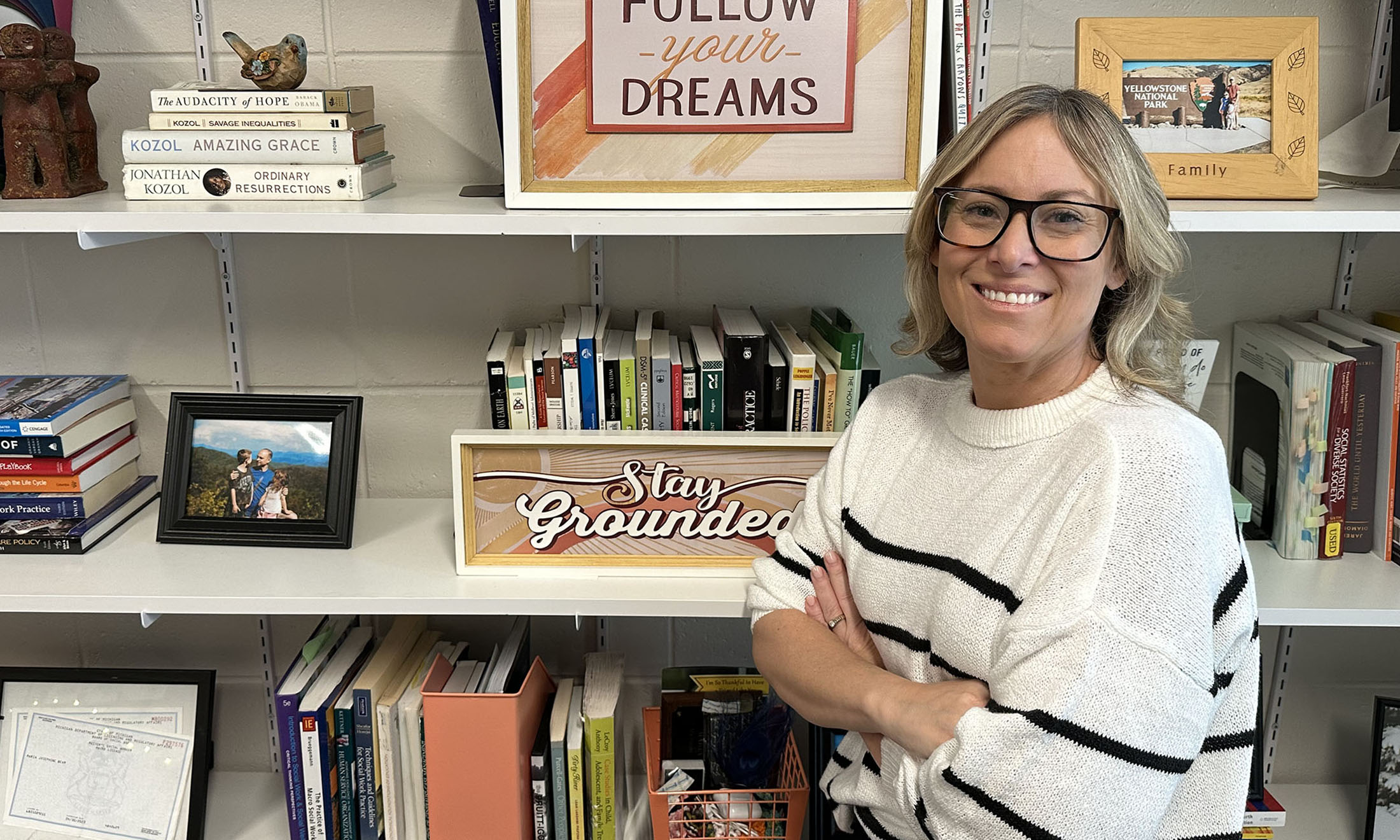Visionary
Master of Social Work director brings in grants and partnerships as new program thrives
The Oakland University Master of Social Work (MSW) program has gone from simply an idea to an overwhelming success in a few short years.
A large part of that success can be attributed to Director of Social Work Maria Beam.
 |
Beam has helped the program become fully accredited by the Council on Social Work Education (CSWE) and has also helped bring in nearly a million dollars in tuition assistance and stipends for students through collaborative grants with Easterseals-MORC, the Michigan Department of Health and Human Services and the Department of Education.
In addition to all Beam has done for the MSW, she was recently appointed to the Michigan Board of Social Workers by Michigan Governor Gretchen Whitmer, and was awarded a Substance Abuse and Mental Health Services (SAMHSA) Grant with OU Professor of Counseling Lisa Hawley for $300,000 over three years.
“Maria Beam is a consummate advocate for the field of social work,” College of Arts and Sciences Dean and Professor Elaine Carey says. “She’s built partnerships with different behavioral health organizations. Her goal is to recruit students who are interested in the field and prepare them to be ready to work within those organizations. She's an amazing advocate for the field and an amazing colleague at Oakland University.”
Financial support for students
The three collaborative grants enable OU to support a total of 38 MSW students for the 2024-25 school year.
Easterseals funds 10 students at $30,000 each. The 10 students also get a paid internship with Easterseals and a job opportunity after graduation.
"They're guaranteed a job and they're guaranteed to get the support to become fully licensed as a practitioner for three years,” Beam says. “Easterseals is the largest community mental health organization in the state of Michigan. They serve more clients than any other community mental health organization, and they do everything from birth to death. They provide behavioral health, mental health and substance abuse services to clients all across Southeast Michigan.”
Beam says the Easterseals partnership was the first of its kind and they used it as a model for other grants.
“We are one of the first institutions to have partnerships with community organizations like Easterseals, and there's no other regional university that has established the type of partnership we have,” Beam says. “We were one of the first institutions to have this workforce expansion model in place with community partners, and because of that we're able to support so many more students. I think these partnerships are a really great opportunity to help support students and to help supplant the workforce.”
The Michigan Department of Health and Human Services supports 13 students with $30,000. Students have to make a commitment to work two years in public behavioral health after graduation.
“With the DHHS students, we placed them all in public behavioral health organizations with the hope that they'll get hired on and they can start their two-year commitment,” Beam says. “Having an internship wasn't necessarily a requirement as part of the DHHS funding, but we thought it was so important to allow them to have the best possible way to becoming employed. We're trying to educate and train them, get them in a place where they can get experience as part of the internship to hopefully secure a place of employment and contribute to the workforce.”
The Department of Education supports 15 students with $15,000 per year and requires students to work two years in public schools after graduation.
“Thanks to this generous support, the MSW program continues to attract and cultivate top-tier talent committed to making a difference in the field of social work,” Beam says. “We are incredibly grateful to our partners for their trust and investment in our mission to educate and empower the next generation of social work leaders.
“As we move forward, we remain dedicated to expanding our partnerships and enhancing our program to provide unparalleled opportunities for our students. This funding not only assists them financially, but also enriches their educational experience, equipping them with the skills and knowledge necessary to excel in their careers and contribute meaningfully to society.”
Board appointment
Beam’s term on the Michigan Board of Social Workers began in late June and runs through December 31, 2027.
Being on the board allows Beam to contribute her vast expertise in clinical social work and higher education to the governance and direction of social work practice across the state. The Michigan Board of Social Workers plays a crucial role in registering social workers and ensuring that the highest standards of professional conduct and education are maintained in Michigan.
“It's really exciting to be an individual who's responsible for the licensing and the regulation of our field,” Beam says. “I think a lot of the work will be the oversight of licensed clinicians and making sure that they're adhering to all of the requirements to maintain the integrity and the ethical practice of our work.”
Beam says she’s able to bring a unique perspective to the board as someone who works in higher education and is responsible for the training of future social workers.
“I’m able to bring the perspective of what's happening in the classroom to the board, and ensuring that what happens in the classroom aligns with the State of Michigan public health code and scope of practice,” Beam says. “I'm excited to be able to share information of what programs are held responsible for and make that connection to what it looks like in actual practice, and being part of the governing body that sets those expectations.”
SAMHSA Grant
Beam will be working with Hawley on a three-year SAMHSA grant totaling $300,000. The grant will focus on increasing expertise, resources and campus community resources for student mental health.
The initiative seeks to expand the number of trained counseling and social work students who can provide mental health support and suicide prevention throughout the campus and community. It emphasizes incorporating DEI principles to promote help-seeking behaviors among underrepresented students. These efforts will ensure a strong support network, integrating both on-campus resources and community services, to address the immediate and long-term mental health needs of students.
“This SAMHSA grant is a significant opportunity to train our social work students, providing them with the tools and experience to address our campus mental health needs,” Beam says. “This initiative strengthens our commitment to expanding the infrastructure necessary for promoting mental health awareness and suicide prevention across our campus community.”
Learn more about the Master of Social Work program.


 June 27, 2024
June 27, 2024







